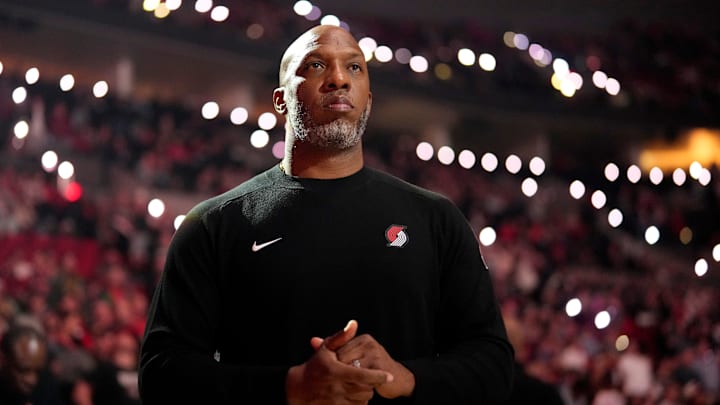Sports leagues shouldn’t be shocked that players (and now coaches) are getting caught up in sports gambling, despite the clear rules against it. Yes, they make millions, and risking that over a bet seems irrational. Yet, Chauncey Billups and Terry Rozier are the latest examples of how the popularization, legalization and normalization of sports gambling has blurred lines.
Billups, the head coach of the Portland Trail Blazers, and Rozier, a guard for the Miami Heat, were arrested nearly hours apart during an FBI probe into illegal sports gambling rings.
According to a story in the Associated Press, Billups is accused of participating in a wide-ranging scheme to rig underground poker games associated with the Mafia, while Rozier is accused of participating in illegal sports gambling schemes using private, NBA insider information. Both Billups and Rozier are also facing money laundering and wire fraud conspiracy charges.
The FBI’s investigation and the scope of these allegations mark this different from most sports gambling scandals we’ve seen, with players facing jail time — not just suspensions. It also underscores the contradictions that legalized sports betting has introduced into the games themselves.
The NBA, NFL, MLB and now even the NCAA invited gambling into their organizations and fan experiences, and through that into their locker rooms and clubhouses. Professionals getting involved in bigger schemes? The leagues should have seen this coming when they sold their soul to sports gambling.
Professional leagues romanticizing sports gambling has handcuffed them in the worst way possible
In just the past year, the NBA has had Billups, Rozier, Malik Beasley and Jontay Porter all involved in some sort of sports gambling scandal. With gambling logos plastered over courts and aprons around the arena, are you surprised if these habits start creeping into locker rooms too?
Kevin Durant isn’t shy about engaging with fans, especially after being heckled for costing someone a prop bet on one of the countless platforms offering wagers. It’s a daily conversation among friends, coworkers and now athletes. Sports gambling has become the centerpiece of sports, even the worldwide leader has established its own betting service. Segments are built into NFL, NBA and CFB pregame coverage. ESPN literally had an on-screen banner for their sports book ESPN Bet while talking about the Billups-Rozier allegations. They can’t even talk about gambling without selling it.
ESPN just quietly removed their “ESPN Bet” logo during a segment on Terry Rozier and Chauncey Billups’ gambling arrests this morning
— Legion Hoops (@LegionHoops) October 23, 2025
You can’t make this up. 💀💀💀 pic.twitter.com/gGFmVCqhR0
College GameDay made picks based on spreads, not who they think will win. The conversation about sports now has shifted from talking about how good teams are to which teams you’d bet the spread or moneyline on. Prop bets on players and how well you think they’ll perform are here to stay too.
And this is a problem because people — players, coaches, fans — become the victims, not the leagues. It’s easy to say, “Well they should just follow the rules." But how hard is it to resist crossing the line when gambling is constantly sold as part of the fun?
Platforms offer free bet promotions for new users. They know how much sports gambling has dominated the conversation, they know how to reel you in, and they know the feeling of a big pay-out is intoxicating. The math is there. Getting someone to place even a single bet has a good chance of leading to more money down the line for sportsbooks.
The NCAA is setting its collegiate athletes up to fail with latest ruling allowing players, staff to gamble
Not even 24 hours before Billups, Rozier and Damon Jones, a former player, were arrested and named in an FBI indictment, the NCAA approved a plan where student athletes and coaches could participate in sports betting on professional sports. That’s right, the amateur league built to establish the future stars of professional sports is now allowing gambling on sports.
Now official: College athletes and school staff can bet on pro sports, beginning on Nov. 1.
— Nicole Auerbach (@NicoleAuerbach) October 22, 2025
All three Divisions have voted to approve the change, per the NCAA.
Not only has the NCAA approved athletes to gamble, a gray area in itself, but it’s also setting them up to fail, fostering a dangerous habit before their professional careers even begin. The NCAA is supposed to prepare its athletes for success, yet it’s creating conditions that could push them toward the same line too many players have already crossed.
This makes Pete Rose’s betting decades ago — before it was popularized, and legal — look like a misdemeanor in the sports world. We haven’t come that far since then, and it’s only going to get worse. Billups, Rozier, Jones and the plethora of other names listed in the FBI’s investigation are just the ones who were caught.
Illegal gambling networks still exist everywhere, and if players can’t place bets publicly the way they could in college, might some inevitably turn to riskier, underground options? That’s the cycle we’ve certainly created. Corporations and sports leagues are working in their own best financial interest, and they clearly don’t care how many people get hurt in the process.
